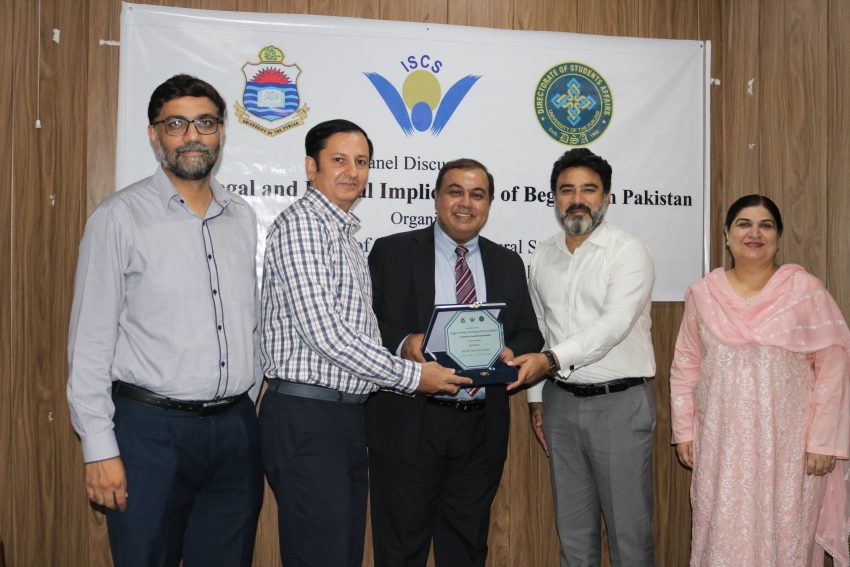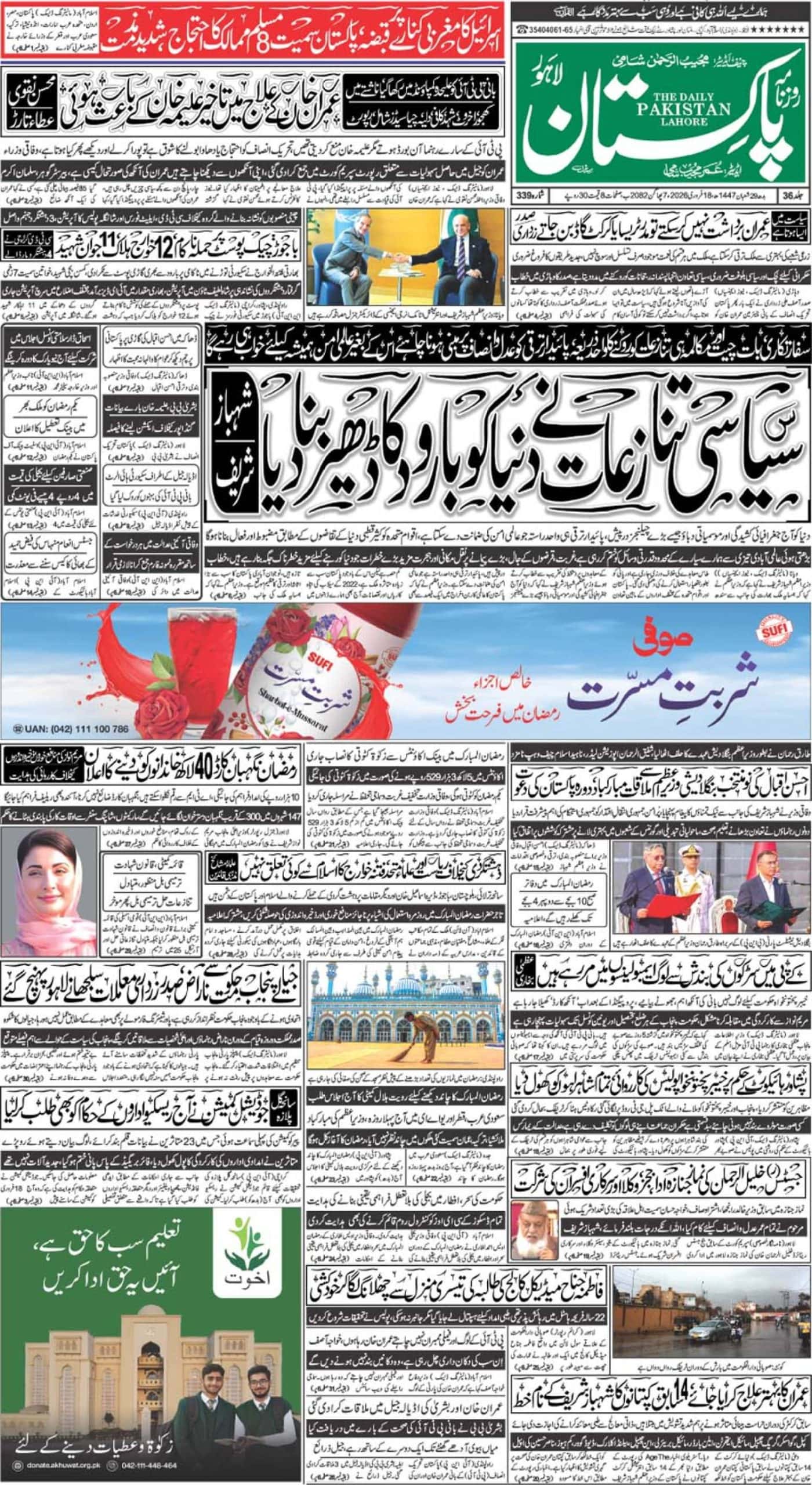LAHORE – The Institute of Social and Cultural Studies (ISCS), University of the Punjab, held a thought-provoking panel discussion today on the topic “Socio-Legal and Ethical Implications of Beggary in Pakistan.”
The event brought together distinguished academics, legal experts, media professionals, and government officials to deliberate on the pressing issue of beggary and its multifaceted consequences on Pakistani society.
The session began with the recitation of the Holy Quran, followed by a welcome address from Dr. Farhan Navid Yousaf, Director ISCS. In his opening remarks, Dr. Yousaf welcomed the panelists, students, and faculty members and shed light on how Pakistan’s socio-cultural fabric fuels the phenomenon of beggary. He emphasized the negative impact this issue has on the country’s global image and the need for coordinated action by the government, civil society, and the public.
Panelists Prof. Dr. Farhan Navid Yousaf, Dr. Shahzeb Khan, Dr. Nadeem Abbas, Barrister Haaris Ramzan, Mr. Muzammal Yar, Mr. Ajmal Jami, Col. Shahzad Amir (R) and Prof Dr. Hazir Ullah contributed in penal discussion and argued that this issue has become extremely serious so government institutions, civil societies and think tanks should raise the voice against this curse.
Further Dr. Nadeem Abbas, a sociologist with expertise in road safety, presented alarming data from the WHO 2018 report, stating that 1.2 million people die globally in road accidents annually, with beggars at traffic signals contributing significantly to unsafe road conditions in Pakistan. He emphasized the need for strict enforcement of anti-beggary laws and massive awareness campaigns to redirect charity to institutions rather than individuals on the streets.
Mr. Muzammal Yar, from the Social Welfare Department, elaborated on the 1958 Anti-Beggary Act and the efforts made since 2015 through beggar homes that offer rehabilitation, vocational training, and healthcare. He highlighted the importance of multi-sectoral collaboration, the regulation of charitable donations, and the potential development of a digital platform listing verified beneficiaries such as orphans, widows, and the elderly.
Renowned Journalist Mr. Ajmal Jami stressed that charity, while deeply rooted in religious values, is being exploited by organized beggary networks. He called upon religious scholars and students to play a catalytic role in creating change and urged the youth to take individual steps for societal reform.
Barrister Haaris Ramzan identified key loopholes in the Punjab Vagrancy Ordinance 1958 and noted the lack of effectiveness among law enforcement agencies. He emphasized the role of family institutions in nurturing responsible citizens and lamented the erosion of moral values in younger generations. According to him, the paradigm shift in societal values has significantly contributed to the normalization of beggary. He criticized the current bureaucratic processes for being exclusive and failing to engage youth in meaningful ways. “Change throughout history has always involved student engagement,” he said. He proposed inclusive policymaking through public-private partnerships, sustainable budget allocations, and the involvement of top business houses. “Behavioral change must come from within. Mere penalties won’t solve the issue,” he stressed.
Dr. Shahzeb Khan, Director Students Affairs, University of the Punjab, emphasized the importance of collective belonging and community action. He shared how students from various departments of University of the Punjab have been encouraged to design and implement community-based projects aligned with Sustainable Development Goals during summer vacations. He added that the most impactful projects will be recognized and rewarded. He stated that “students have energy and passion which must be channeled to uplift communities and combat social evils like beggary.”
Col. Shahzad Amir (R) CEO Charity commission highlighted that awareness leads to solutions. He pointed out that Pakistan has a strong philanthropic tradition rooted in religious teachings, which unfortunately is exploited by beggars. He raised alarm over Pakistan’s placement in Tier 2 of the Human Trafficking report, warning that if the country slips to Tier 3, it could face serious international sanctions. He stated that organized beggary is often linked to other crimes such as commercial sex and drug abuse, and called for urgent public sensitization and involvement of religious scholars to halt this growing crisis.
Following the panel discussion, students actively participated by asking thought-provoking and engaging questions from the experts, demonstrating their eagerness to be part of the solution.
The session concluded with remarks from Dr. Hazir Ullah, Vice Chancellor, University of Chitral, who described beggary as a serious, complex, and multi-sectoral issue that demands equally serious, coordinated solutions. He shared a startling statistic that 90% of the world’s beggars are reportedly from Pakistan, urging the nation to act now to protect its international image. He stressed that beggars not only sustain the cycle of poverty but also reproduce it by involving their children. Charity, he noted, must come with responsibility, and educational curricula should address these issues through stories and awareness content. He called for a nationwide awareness campaign, the use of street signage with clear messaging, and strong legal action against organized beggary networks. He concluded by saying, “We must challenge misinterpretations of religious thoughts and must today commit to ‘each one, teach one’, which would be a stronger chain than that of the beggars.”
Finally, Prof. Dr. Farhan Navid Yousaf thanked all panelists for their meaningful contributions and acknowledged the presence and participation of students and faculty. Prof. Dr. Farhan Navid Yousaf and Prof. Dr. Rehan Sheikh, Director General, University of the Punjab, presented commemorative shields to the distinguished panelists as a token of appreciation.













